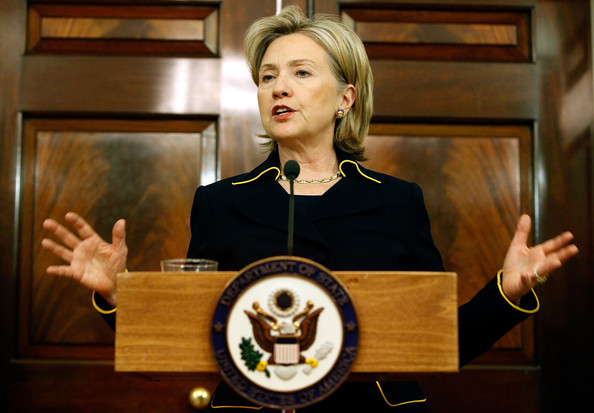As the New Hampshire presidential primary approaches (February 9), the national political press is consumed with speculation over Donald Trump’s lead in the GOP. Secondarily, it is speculating over how well Sen. Bernie Sanders’ lead on the Democratic side will hold up. The corollary re the GOP is that establishment candidates must be ‘winnowed’, so that Republicans can ‘coalesce’ around an alternative to Trump or Ted Cruz. The corollary re the Democrats is that loaded-with-minuses Hillary Clinton is in for the long haul, on her way to her still-inevitable nomination. Commentators do not always put it that way, but that’s the gist.
Not too ironically, one of the more interesting aspects of the 2016 race is what the national political press is not discussing. This has happened before. An avalanche of commentary in 2014 failed to disclose that the GOP ‘wave’ had a key cause: in state after state, the GOP saw to it that, while tea party candidates proliferated, party-establishment candidates had a clear path to nomination. Thus the arithmetic of the field virtually always prevailed, and in favor of the party’s preferred candidate. The relatively plausible candidate then went on, in most races, to win–especially against Blue-Dog, Clinton-like, triangulating-type Dems. More on that later.
The insurgent types seem to have learned a lesson from 2014, by the way. Trump may be a human cue ball, but most of the ‘winnowing’ this time has occurred in the non-establishment lane, as it’s now being called. Dropouts so far Bobby Jindal, Rand Paul, Mike Huckabee, and Rick Santorum would all be competing for the insurgent vote, if they were still in; Rick Perry and Scott Walker somewhat; only George Pataki and Lindsey Graham perhaps not. Thus with nine presidential candidates remaining, the GOP now has six candidates competing for establishment support–Jeb Bush, Chris Christie, Carly Fiorina, Jim Gilmore, John Kasich, and Marco Rubio. Only two are competing for the tea party-evangelical vote–Ben Carson and Ted Cruz. Trump is running sui generis, salesman that he is.
I do not pretend to have a forecast for the New Hampshire primary. In the interest of full disclosure–to make my own position clear–if I lived in NH I would be voting for Senator Sanders. My own guess is that if Trump were to drop out of the GOP race or to do so poorly as to become irrelevant, his supporters would scatter or drop out, too. Pretty dreary prospect.

Sanders 2016
Back to what’s not being reported. First, the Republicans.
Whatever the outcome in New Hampshire, for anyone who can do arithmetic, the GOP candidate with the best chance long-term is still Jeb Bush–IF he chooses to stay in the race. Christie is ghastly. Fiorina is being sidelined pretty emphatically, in spite of her efforts to out-ugly the uglies. She would probably be sidelined more explicitly, except that the party is trying (sort of) to keep some women voters. Gilmore is being thoroughly ignored. Kasich is under none-too-subtle pressure to make like Scott Walker and bow out; that happens to GOP candidates who occasionally pay lip service to working people. The focus of commentary at the moment is on the GOP candidate most like Bush–Rubio. A few weeks of voting should answer some questions. Bush has the backing to survive not being voted for; Rubio may not. The big question is whether Bush and his backers stay in.

Jeb Bush
Meanwhile, in the tea party-ish lane, Ben Carson is facing an onslaught from Cruz, whom nobody can out-ugly. If insurgent voters were to turn on Cruz in revulsion, that whole wing of the GOP would change in a heartbeat. With Cruz hypothetically not a factor, his supporters would probably split among Carson, Trump, the multiple-candidate lane, and dropping out or voting Democratic. It will be interesting to see how they vote in New Hampshire.
So, back to the non-reported: what no esteemed commentator says about Jeb Bush is that the invasion of Iraq cost the United States dearly. No pundits bring up the statistical facts–the Iraqi civilians killed in the invasion and afterward; the assassinations of Iraqi college professors under the Coalition Provisional Authority; the deaths and injuries in American troops. No commentators point that Team Bush has never apologized for the harm done to fellow human beings, or even for the harm done to America around the globe. No mention of Iraqi children, or babies, killed; no reminder of the horrors of the Bush years–Fallujah, collateral damage, sexual assaults in the military and out of it.
Few commentators on the GOP candidates remind the public that George W. Bush used the attacks of September 11, 2001, as a pretext for invading Iraq. Not one major media figure has pointed out what I pointed out in 2002-2003, the luminously simple statement of fact that every American can understand: “The Iraqis didn’t do it.” There were no Iraqis among the hijackers. Nor do commentators tend to bring up ‘weapons of mass destruction’. (Neither do the Clintons; see below.)
Instead, we get commentary-lite, on the Jeb Bush ‘baggage’ in narrowly political terms. Two recent examples come from the pro-GOP Roll Call. One piece refers to “the family legacy” as a blessing and a curse, and to concerns about the effect on the candidate’s electability. The fact that the family has not expressed responsibility, let alone contrition, for our situation in the Middle East is omitted. Indeed, Jeb Bush says that people concerned about the actions of his father and brother need to “get therapy”–to the applause of his audience.
A succinct summary of the ethics-lite perspective is provided in the other piece:
“Bush has plenty of credentials, but they are less valuable this year. The Bush brand, once strong, was severely damaged by his brother, and Jeb himself doesn’t fit the times, when long political bloodlines and deep establishment connections are liabilities, not assets. He is, to put it bluntly, old news at a time when Republicans are looking for something new and different. For many Republicans, his name told them everything they needed to know about him and his candidacy.”
This is the way to acknowledge the biggest foreign-policy mistake in fifty years? Even Donald Trump does a better analysis of the Iraq War. Incidentally, Trump also provided a pretty good thumbnail of the effect (on the GOP) in political terms: “Lincoln couldn’t have gotten elected.” (Of course, Trump like all the GOPers blames President Obama. In my view, this is a cynical ploy to take advantage of voters too illiterate to understand that the invasion of Iraq happened before Obama’s watch, and over his opposition to the war.)
Needless to say, the same utter lack of contrition and the same failure to take responsibility extend to the Wall Street debacle in subprime lending. And the national political media tend to fall in line here, too. Too seldom is Jeb Bush, or any Republican candidate, held to account for his/her sympathy or collusion with the giant perpetrators. Meanwhile, the GOP gets to rail unchecked against the president even while unemployment falls, wages rise, prices stay level, the real estate market recovers, housing ownership revives, and coverage for health care expands. You’d think some of these gains were the capture of Osama bin Laden or the release of captured Americans all over again, they are so thoroughly ignored by big-time Republicans. Give credit to President Obama, the man who risks his life daily? Not on your bippy.
Now to the Democratic side.
As with GOP candidates, what is missing from commentary on the Democrats is exactly the information voters need. Hillary Clinton would be a disastrous nominee for Dems, but she has lined up segments of the media establishment along with her ‘Super Delegates’ and other connections.
Clinton is running basically on four planks, one semi-hidden–her electability; her inevitability (behind the scenes); her being a Democrat; and her “experience,” with the claim that she gets things done. Each claim is spurious. Setting aside longer examination for now, do they stand up to quick scrutiny? In order —
If Clinton is electable, why is she struggling so much for the nomination that she and her donors did their best to sew up beforehand? If Bill Clinton is ‘one of the best politicians of his generation’, then why did the Clintons leave the Democratic Party in shambles in Arkansas? Why was Arkansas a blue state when the Clintons began there, and a red state after their thirty-plus years? Why didn’t Hillary Clinton run for the senate from Arkansas? Speaking of New York, has there been a wave of Blue wins since the Clintons relocated there? Why did Marjorie Margolies (Mezvinsky), mother of the Clintons’ son-in-law, lose resoundingly in her New York district? The simple fact is that the Clintons are not beloved, and their coattails are nonexistent. Much of MSNBC in the tank for the Clintons. How are MSNBC’s ratings nowadays? Virginia results in 2015 were disappointing for Dems. Governor McAuliffe, widely billed as a chief Clinton ally, is not deeply beloved. Neither are the Clintons. After Clinton campaigned in Virginia in 2013, McAuliffe barely squeaked out a victory–and that was over Ken ‘Kook’ Cucinelli.
If Clinton was inevitable, why did her supporters do so much behind the scenes to keep other candidates from running? Do these machinations express confidence in their candidate?
Democrats? The Clintons are triangulators. They may be liberal on social issues, but as their track record shows, they have a pattern of shafting labor–even after receiving generous donations and support from labor, and from working people. Before she started sounding like Elizabeth Warren a few months ago, when was Clinton ever forceful on economic justice? In the senate, she voted for the resolution enabling GWBush to invade Iraq. Before that, as first lady she partnered in Bill Clinton’s anti-populist path. Before that, as wife of the candidate she stood by while Bill Clinton flew back to Arkansas to endorse personally the state’s execution of a mentally disabled African-American man.
What has Clinton ‘gotten done’? Did she work to reduce the backlog of rape kits? She now talks the game on student debt, etc., but did she ever work with her donors who are lenders to help with it before? Did she do anything beforehand to impede the coming subprime-derivatives meltdown? Did she support policies to rein in Wall Street (or the good ol’ boys in the C of C), either in Arkansas or later? Did she support gun control, before this past fall? Does her track record include support for clemency, for anyone besides Marc Rich?
These are character questions as well as economic-policy questions. Hillary Clinton is not Elizabeth Warren, and should not pretend to be. She is not someone who ‘fights for’ people outside her immediate circle. That’s not who she is. Clinton herself touts misogynistic and sexist attacks against her–but she has never stepped outside her comfort zone to defend other women, in her life. She is no Ann Richards–who endured savage and misogynistic attacks but without selling out. Clinton’s State Department emails show no consideration for President Obama, let alone for Vice President Biden. Clinton and her people, inside and outside her office, kept a wary eye out for any signs that anyone else (good) might be popular. She did the same in Arkansas, for decades. So did her husband.
One of the main problems analyzing the Clinton candidacy is that too much is deemed off-limits as ‘personal’. There is an unstated definition of ‘personal’ as ‘private’, even when the person is running for the White House. For obvious reasons, the Clintons themselves try to bat away every question of character, and many questions of policy, as mere gossip. But this strategy misconstrues the concept of the personal. Clinton has been married for decades to a man whose degrading treatment of her and of many other women is amply documented. This is not ‘right-wing conspiracy’. It is fact. It is also spousal bullying. (No, it’s not romance. It’s not intrigue. It’s not titillation. It was probably barely even sex. It’s spousal bullying–aimed at one’s own partner, while also demeaning the numerous other women involved.)
She shows the symptoms, by the way–that weird lack of judgment, that weirdly dehumanized Stay- Puft complacency, the perpetual calculatedness, the inability to empathize with any woman not ‘successful’ or established, etc.
And how did Clinton herself ‘stand up’ to the spousal bullying? –By working for the spouse’s political career, by helping the spouse advance up the ladder, by helping him into the White House. For my money, there is no way Bill Clinton could have won in 1992 if his wife had not stoutly denied every (true) accusation against him. As a result, Hillary Clinton became rich and famous; her husband became rich and famous; Arkansas was left behind. Reminding the public of this track record is not the same as gossiping about a neighbor. To remember the over-all track record of dishonesty, humiliation, and other forms of bullying is not the same as criticizing some poor woman for failing to take exactly the right course of action against an abuser. Clinton is now running for the White House, and now has all the resources in the world–entirely because of her long-term partnership with Bill Clinton. And she’s talking about the man with a credible accusation of sexual assault against him as “First Dude.”
There is not enough space here to discuss the problems with the ‘having it all’ version of feminism. Careerism is not feminism.
But the problems with the GOP and the Democratic races have one hideous parallel–that signature lack of shame. No matter what mistakes they make, no matter what harm they have caused–no shame, no remorse, no contrition. No amends. And the political media establishment is playing along on both sides.

















